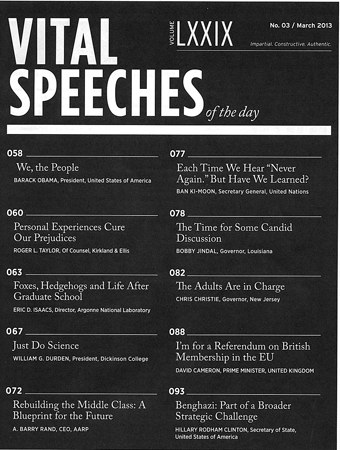Vital Speeches, Exalted Company
President Durden honored in magazine highlighting speeches by groundbreaking thought leaders

by MaryAlice Bitts-Jackson
What does Dickinson’s president have in common with Barack Obama, Hillary Clinton, David Cameron, Chris Christie, Ban Ki-Moon and Bobby Jindal? All are honored in the March 2013 issue of Vital Speeches, a publication that highlights some of the most thought-provoking and important public addresses of our time.
President William G. Durden ’71’s contribution, “Just Do Science,” explains the role of the liberal-arts college in undergraduate science education and positions Dickinson as a leader in that realm. It keeps company in print with the U.S. president’s 2013 inaugural address; a foreign-policy analysis by the United Nations secretary general; the British prime minister’s thoughts on U.K. membership in the European Union; the secretary of state’s view on Benghazi; the middle class, interpreted by the CEO of the AARP; and a post-Katrina reflection by the governor of Louisiana, among other works.
Durden delivered the speech as keynote speaker at the 2013 Gateway Sciences Initiative Symposium, a Jan. 17 event focused on improving science education at Johns Hopkins University. In it, he stressed that Dickinson’s interdisciplinary, hands-on and research-focused approach to the sciences—combined with the liberal-arts emphasis on written skills—has produced “an exceptionally dynamic undergraduate science program” that has yielded continued alumni engagement in science.
To be sure, “Just Do Science” is only one of many speeches and publications Durden has produced during his 14 years as president of his alma mater. But Durden, who will retire from that post this summer, says that the message it carries—and the timing of its publication—hold special significance.
“I wrote this speech to offer an analysis of the liberal-arts approach to the sciences to the Johns Hopkins audience of administrators and science faculty,” he says, “ but I also wanted to convey the singular quality of science education at Dickinson. Before I left the college, I wanted to make sure that this distinction was articulated to its fullest to the general public and that what we do so well was given a name.”
Published March 29, 2013